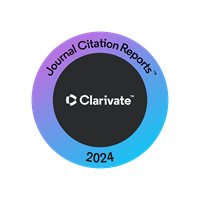Soybean macronutrient availability and yield as affected by tillage system
Resumo
The effect of tillage system (NT-no tillage; CT-conventional tillage; MT-minimum tillage; and NT/scarification, every three years) on soybean nutrient availability and yield was evaluated on Oxisol after 12 years of cultivation. Soil samples were collected at depths of 0.00-0.05, 0.05-0.10, and 0.10-0.20 m and were analyzed for P, K, Ca, Mg, carbon (C), organic matter (OM), pH value, potential CEC, base saturation (BS%), and number of semiquinone organic radicals. The macronutrient concentration in the leaves and amount accumulated in the plants at the blooming stage were determined, as well as the yield of the two soybean crops. The soil pH value, BS% and K, Ca, and Mg concentrations were not influenced by the tillage system. The soil P and OM in the surface layer, however, were inversely proportional to the intensity of soil preparation. The P content in the soil surface layer under NT was twice as high as that of soil under CT. The P content in the soybean leaves under NT was also higher compared to that in the plants under CT and MT. The number of semiquinone radicals was low in the soil surface layer under NT, indicating a small degree of humification. However, soybean yield was not affected by the tillage system.
Downloads
Referências
Aziz, I., Mahmood, T., & Islam, K. R. (2013). Effect of long term no-till and conventional tillage practices on soil quality. Soil and Tillage Research, 131(1), 28-35. DOI: 10.1016/j.still.2013.03.002
Bayer, C., Martin-Neto, L., Mielniczukc, J. & Ceretta, C. A. (2000). Effect of no-till cropping systems on soil organic matter in a sandy clay loam Acrisol from Southern Brazil by electron spin resonance and nuclear magnetic resonance. Soil and Tillage Research, 53(2), 95-104. DOI: 10.1016/S0167-1987(99)00088-4
Bayer, C., Martin-Neto, L., Mielniczukc, J., & Ernani, P. R. (2002a). Stocks and humification degree of organic matter fractions as affected by no-tillage on a subtropical soil. Plant and Soil, 238(1), 133-140.
Bayer, C., Martin-Neto, L., Mielniczukc, J., & Ernani, P. R. (2002b). Tillage and cropping system effects on soil humic acid characteristic as determined by electron spin resonance and fluorescence spectroscopies. Geoderma, 105(1-2), 81-92. DOI: 10.1016/S0016-7061(01)00093-3.
Caires, E. F., Alleoni, L. R. F., Cambri, M. A., & Barth, G. (2005). Surface application of lime for crop grain production under a no-till system. Agronomy Journal, 97(3), 791-798. DOI: 10.2134/agronj2004.0207
Cook, R. L., & Trlica, A. (2016). Tillage and fertilizer effects on crop yield and soil properties over 45 years in Southern Illinois. Agronomy Journal, 108(1), 415-426. DOI: 10.2134/agronj2015.0397
Dick, W. A., McCox, E. L., Edwards, W. M., & Lal, R. (1991). Continuous application of no-tillage to Ohio soil. Agronomy Journal, 83(1), 63-73. DOI: 10.2134/agronj1991.00021962008300010017x
Edwards, J. H., Thurlow, D. L., & Eason, J. T. (1988). Influence of tillage and crop rotation on yields of corn, soybean, and wheat. Agronomy Journal, 80(1), 76-80. DOI: 10.2134/agronj1988.00021962008000010018x.
Edwards, J. H., Wood, C. W., Thurlow, D. L., & Ruf, M. E. (1992). Tillage and crop rotation on fertility status of a Hapludult soil. Soil Science Society of America Journal, 56(5), 1577-1582. DOI: 10.2136/sssaj1992.03615995005600050040x
Empresa Brasileira de Pesquisa Agropecuária [EMBRAPA]. (2013). Tecnologias de produção de soja - Região Central do Brasil. Londrina, PR: Embrapa Soja.
Evangelou, V. P., & Marsi, M. (2001). Composition and metal ion complexation behavour of humic factions derived from corn tissue. Plant and Soil, 229(1), 13-24.
Food and Agriculture Organization of United Nations [FAO]. (1998). Word reference base for soil resources. Rome, IT: FAO.
Ferreira, E. B., Cavalcanti, P. P., & Nogueira, D. A. (2014). ExpDes: An R package for ANOVA and experimental designs. Applied Mathematics, 5(19), 2952-2958. DOI: 10.4236/am.2014.519280.
Fink, J. R., Inda, A. V., Bavaresco, J., Barrón, V., & Torrent, J. (2016). Adsorption and desorption of phosphorus in subtropical soils as affected by management system and mineralogy. Soil and Tillage Research, 155, 62-68. DOI: 10.1016/j.still.2015.07.017
Fonseca, A. F., Caires, E. F., & Barth, G. (2010). Extraction methods and availability of micronutrients for wheat under a no-till system with a surface application of lime. Scientia Agricola, 67(1), 60–70. DOI: 10.1590/S0103-90162010000100009
Grove, J. H., & Blevins, R. L. (1988). Correcting soil acidification in continuous corn (Zea mays L.): N rate, tillage and time. Communications in Soil Science and Plant Analysis, 19(7-12), 1331-1342. DOI: 10.1080/00103628809368016
Kibet, L., Blanco-Canqui, H., & Jasa, P. (2016). Long-term tillage impacts on soil organic matter components and related properties on a Typic Argiudoll. Soil and Tillage Research, 155, 78-84. DOI: 10.1016/j.still.2015.05.006
Lacerda, J. J. J., Resende, A. V., Furtini-Neto, A. E., Hickmann, C., & Conceição, O. P. (2015). Adubação, produtividade e rentabilidade da rotação entre soja e milho em solo com fertilidade construída. Pesquisa Agropecuária Brasileira, 50(9), 769-778 DOI: 10.1590/S0100-204X2015000900005
Lal, R., Mahboubi, A. A., & Fausey, N. R. (1994). Long-term tillage and rotation effects on properties of a central Ohio soil. Soil Science Society of America Journal, 58(2), 517–522. DOI: 10.2136/sssaj1994.03615995005800020038x
Lavado, R. S., Porcelli, C. A., & Alvarez, R. (2001). Nutrient and heavy metal concentration and distribution in corn, soybean and wheat as affected by different tillage systems in the Argentine Pampas. Soil and Tillage Research, 62(1-2), 55-60. DOI: 10.1016/s0167-1987(01)00216-1
Malavolta, E., Vitti, G. C., & Oliveira, S. A. (1997). Avaliação do estado nutricional das plantas: princípios e aplicações. Piracicaba, SP: Potafos.
Martínez, I., Chervet, A., Weisskop, F. P., Sturny, W. G., Etana, A., Stettler, M. ... Keller, T. (2016). Two decades of no-till in the Oberacker long-term field experiment: Part I. Crop yield, soil organic carbon and nutrient distribution in the soil profile. Soil and Tillage Research, 163, 141-151. DOI: 10.1016/j.still.2016.05.021
Martin-Neto, L., Rosell, R., & Sposito, G. (1998). Correlation of spectroscopic indications of humification with mean annual rainfall along a temperature grassland climosequence. Geoderma, 81(3-4), 305-311. DOI: 10.1016/S0016-7061(97)00089-X
Moreira, S. G., Prochnow, L. I., Kiehl, J. C., Pauletti, V., & Martin-Neto, L. (2016). Chemical forms in soil and availability of manganese and zinc to soybean in soil under different tillage systems. Soil and Tillage Research, 163, 41-53. DOI: 10.1016/j.still.2016.05.007
Motta, A. C., Reeves, D. W., & Touchton, J. T. (2002). Tillage intensity effects on chemical indicators of soil quality in two coastal plain soils. Communications in Soil Science and Plant Analysis, 33(5-6) 913-932. DOI: 10.1081/CSS-120003074
Motschenbacher, J. M., Brye, K. R., Anders, M. M., & Gbur, E. E. ( 2014). Long-term rice rotation, tillage, and fertility effects on near-surface chemical properties in a silt-loam soil. Nutrient Cycling in Agroecosystems, 100(1), 77-94. DOI: 10.1007/s10705-014-9628-7
Nielsen, J., & Woodard, H. (2015). Corn and soybean responses to two tillage systems in a cool growing season. Open Journal of Soil Science, 5(8), 157-168. DOI: 10.4236/ojss.2015.58016
Pavinato, P. S., Dao, T. H., & Rosolem, C. A. (2010). Tillage and phosphorus management efffects on enzyme-labile bioactive phosphorus availability in Cerrado Oxysols. Geoderma, 156(3-4), 207-215. DOI: 10.1016/j.geoderma.2010.02.019
Pedrinho-Junior, A. F. F., Bianco, S., & Pitelli, R. A. (2004). Accumulation of dry mass and macronutrients by plants of Glycine max and Richardia brasiliensis. Planta Daninha, 22(1) 53-61. DOI: 10.1590/S0100-83582004000100007
Pérez, M. G., Martin-Neto, L., Saab, S. C., Novotny, E. H., Milori, D. M. B. P., Bagnato, V., ... Knicker, H. (2004). Characterization of humic acids from a Brazilian Oxisol under different tillage systems by EPR, 13C NMR, FTIR and fluorescence spectroscopy. Geoderma, 118(3-4) 181-190. DOI: 10.1016/S0016-7061(03)00192-7
Raij, B. V., Cantarella, H., Quaggio, J. A.,& Furlani, A. M. C. (1997). Recomendações de calagem e adubação para o Estado de São Paulo. Campinas, SP: IAC.
Raij, B. V., Quaggio, J. A., Cantarella, H., Ferreira, M. E., Lopes, A. S., & Bataglia, O. C. (1987). Análise química do solo para fins de fertilidade. Campinas, SP: Fundação Cargill.
Reeves, J. L., & Libieg, M. A. (2016). Soil pH and exchangeable cation responses to tillage and fertilizer in dryland cropping systems. Communications in Soil Science and Plant Analysis, 47(21), 2396-2404. DOI: 10.1080/00103624.2016.1243706
Rodrigues, M., Pavinato, P. S., Withers, P. J., Teles, A. P. B., & Herrera, W. F. B. (2016). Legacy phosphorus and no tillage agriculture in tropical oxisols of the Brazilian savanna. Science of the Total Environment, 542(Part B), 1050-1061. DOI: 10.1016/j.scitotenv.2015.08.118
Sainju, U. M., Allen, B., Caesa-Tonthat, T., & Lenssen, A. (2015). Dryland soil chemical properties and crop yields affected by long-term tillage and cropping sequence. SpringerPlus, 4(1) 1-14. DOI: 10.1186/s40064-015-1122-4
Santiago, A., Quintero, J. M., & Delgado, A. (2008). Longterm effects of tillage on the availability of iron, copper, manganese, and zinc in Spanish Vertisol. Soil and Tillage Research, 98(2), 100-107. DOI: 10.1016/j.still.2008.01.002
Silva, G. A., Bonetti, J. A., Souza, E. D., Paulino, H. B, & Carneiro, M. A. C. (2016). Management systems and soil use on fractions and stocks of organic carbon and nitrogen total in cerrado latosol. Bioscience Journal, 32(6), 1482-1492. DOI: 10.14393/BJ-v32n6a2016-32923
Souza, G. P., Figueiredo, C. C., & Sousa, D. M. G., (2016). Soil organic matter as affected by management systems, phosphate fertilization, and cover crops. Pesquisa Agropecuária Brasileira, 51(9), 1668-1676. DOI: 10.1590/s0100-204x2016000900067
Tarkalson, D. D., Hergert, G. W., & Cassman K. G. (2006). Long-term effects of tillage on soil chemical properties and grain yields of a dryland winter wheat-sorghum/corn-fallow rotation in the Great Plains. Agronomy Journal, 98(1), 26–33. DOI: 10.2134/agronj2004.0240
Tiecher, T., Santos, D. R., Kaminski, J., & Calegari, A. (2012). Forms of inorganic phosphorus in soil under different long term soil tillage systems and winter crops. Revista Brasileira de Ciência do Solo, 36(1), 271-281. DOI: 10.1590/S0100-06832012000100028
Triplett, G. B., & Dick, W. A. (2008). No-tillage crop production: A revolution in agriculture. Agronomy Journal Abstract, 100(3), 153-165. DOI: 10.2134/agronj2007.0005c
Zobiole, L. H. S., Oliveira-Júnior., R. S., Constantin, J., Oliveira-Júnior, A., Castro, C., Oliveira, F. A., ... Romagnoli, L. M. (2012). Accumulation of nutrients in conventional soybean and RR soybean in different types of weed control. Planta Daninha, 30(1), 75-85. DOI: 10.1590/S0100-83582012000100009
Wilhelm, W. W., & Wortmann, C. S. (2004). Tillage and rotation interaction for corn and soybean grain yield as affected by precipitation and air temperature. Agronomy Journal, 96(2), 425-432. DOI: 10.2134/agronj2004.4250
DECLARAÇÃO DE ORIGINALIDADE E DIREITOS AUTORAIS
Declaro que o presente artigo é original, não tendo sido submetido à publicação em qualquer outro periódico nacional ou internacional, quer seja em parte ou em sua totalidade.
Os direitos autorais pertencem exclusivamente aos autores. Os direitos de licenciamento utilizados pelo periódico é a licença Creative Commons Attribution 4.0 (CC BY 4.0): são permitidos o compartilhamento (cópia e distribuição do material em qualqer meio ou formato) e adaptação (remix, transformação e criação de material a partir do conteúdo assim licenciado para quaisquer fins, inclusive comerciais.
Recomenda-se a leitura desse link para maiores informações sobre o tema: fornecimento de créditos e referências de forma correta, entre outros detalhes cruciais para uso adequado do material licenciado.




















































